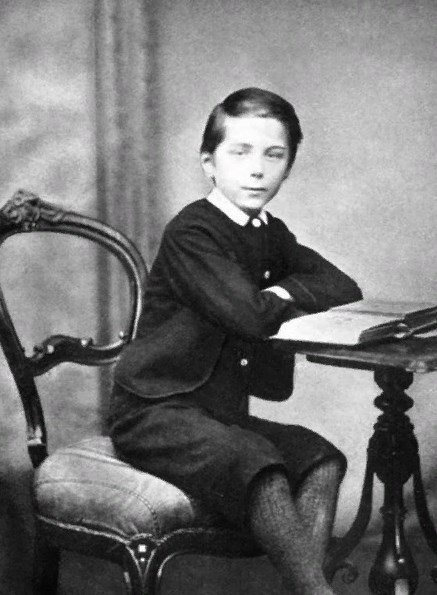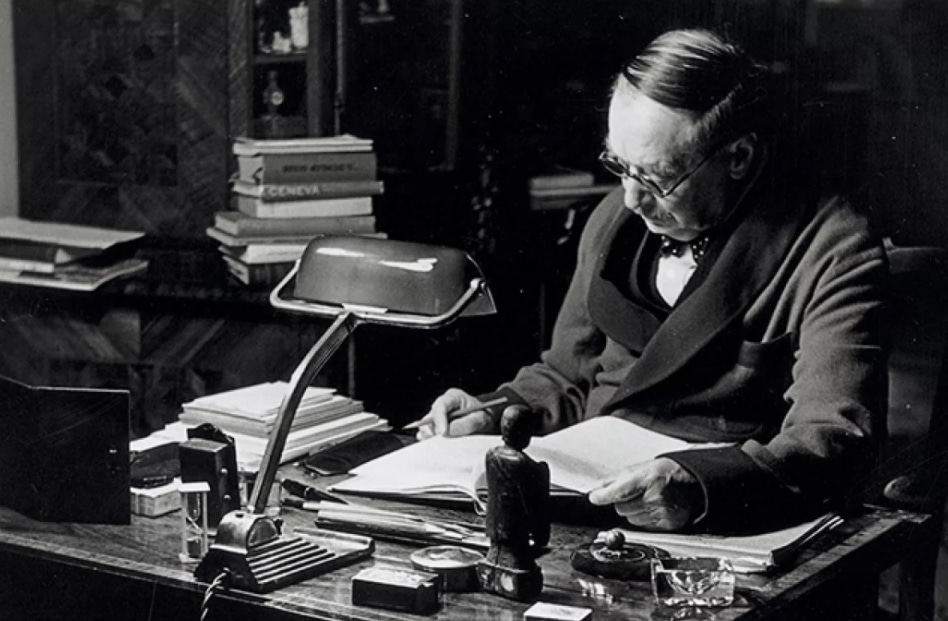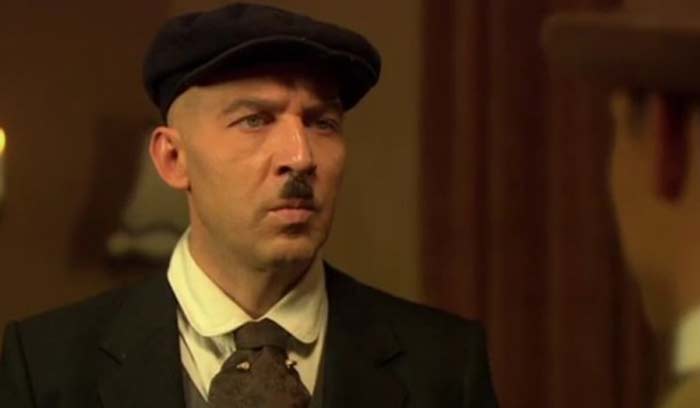Герберт уэллс сообщение на английском
Обновлено: 04.07.2024
- Для учеников 1-11 классов и дошкольников
- Бесплатные сертификаты учителям и участникам
Herbert Wells
Задание 1. Прочитайте и переведите биографию писателя
Задание 2. Запишите в тетрадь краткий пересказ биографии 15-20 предложений, переведите их.
At the end of the 19th century people felt excited about the new discoveries of science, which seemed to promise so much in the future. Only few writers expressed this feeling so well or so lifelike as H.G.Wells. With the French writer Jules Verne he may fairly be called the father of science fiction. But it wasn't the only type of literature that he wrote.
H.G. Wells was born at Bromley in Kent in 1886. He was the son of domestic servants and lived in poverty and hardship. At the age of 14 he was apprenticed to a draper at Windsor. Two years later he became a student assistant at Midhurst Grammar School. At 18 he won a scholarship to study biology at the Normal School of Science, where T.H. Huxley was one of his teachers.In 1891 he made a marriage to his cousin Isabel Mary Wells but it wasn't successful and in 1895 he married Any Catherine Robins. This marriage was to be lasting.
Wells used his knowledge of science as the starting point for a series of exciting fantastic stories. His literary career began with the publication of his first novel The Time Machine in 1895. It was immediately successful, so he began a series of science fiction novels that revealed him as an original writer: The Island of Doctor Moreau (1896), The Invisible Man (1897), The War of the Worlds (1898) and The First Men in the Moon (1901).
For a time he acquired a reputation as a prophet of the future. In The War in the Air he foresaw certain developments in the military use of aircraft. But his imagination flourished at his best in the astronomical fantasies of The First Men in the Moon and The War of the Worlds. He also wrote many short stories, which were collected in The Stolen Bacillus (1895) and Tales of Space and Time (1899).
Eventually, Wells decided to write comic novels of lower middle-class life. Because of the harshness of his early life and its working class background he knew a lot about the problems of ordinary people and wrote about their ambitions and disappointments in novels such as Kipps (1905) and The History of Mr. Polly (1910). These novels are full of humour and life.
Wells felt much of the pessimism prevalent in 1890s. In his short-term view, however, his study of biology led him that human society would evolve into higher forms. Having wrote Anticipations (1901), Mankind in the Making (1903) and A Modern Utopia (1905), he became a leading preacher of the doctrine of social progress. About this time, too, he became an active socialist, and in 1903 joined the Fabian Society. But soon he began to criticize its methods and quarreled with G.B. Shaw and Beatrice Webb. This quarrel is retold in his novel The New Machiavelli (1911), in which Webbs are parodied as the Baileys.Wells was a socialist and he wrote many books about the history and science so that people would be able to understand the important ideas of modern world.
These works include The Outline of History (1920), The Science of Life (1931) and The Shape of Things to Come (1935). At the same time he continued to publish works of fiction in which his gifts of narrative and dialogue give away almost entirely to polemics. His sense of humour reappears, however in Experiment in Autobiography (1934).
Fear of tragic wrong turning in the development of the human race, to which he had early given imaginative expression in the animal mutations of The Island of Doctor Moreau, dominates the shirt novels and fables he wrote in the later 1930s.
Wells was now ill and aging. With the outbreak of World War 2, he lost all confidence in the future, and in Mind at the End of its Tether (1945) he depicts a bleak vision of a world in which nature has rejected, and is destroying humankind.
At the end of the 19th century people felt excited about the new discoveries of science, which seemed to promise so much in the future. Only few writers expressed this feeling so well or so lifelike as H.G.Wells. With the French writer Jules Verne he may fairly be called the father of science fiction. But it wasn't the only type of literature that he wrote.
H.G. Wells was born at Bromley in Kent in 1886. He was the son of domestic servants and lived in poverty and hardship. At the age of 14 he was apprenticed to a draper at Windsor. Two years later he became a student assistant at Midhurst Grammar School. At 18 he won a scholarship to study biology at the Normal School of Science, where T.H. Huxley was one of his teachers. In 1891 he made a marriage to his cousin Isabel Mary Wells but it wasn't successful and in 1895 he married Any Catherine Robins. This marriage was to be lasting.
Wells used his knowledge of science as the starting point for a series of exciting fantastic stories. His literary career began with the publication of his first novel The Time Machine in 1895. It was immediately successful, so he began a series of science fiction novels that revealed him as an original writer: The Island of Doctor Moreau (1896), The Invisible Man (1897), The War of the Worlds (1898) and The First Men in the Moon (1901).
For a time he acquired a reputation as a prophet of the future. In The War in the Air he foresaw certain developments in the military use of aircraft. But his imagination flourished at his best in the astronomical fantasies of The First Men in the Moon and The War of the Worlds. He also wrote many short stories, which were collected in The Stolen Bacillus (1895) and Tales of Space and Time (1899).
Eventually, Wells decided to write comic novels of lower middle-class life. Because of the harshness of his early life and its working class background he knew a lot about the problems of ordinary people and wrote about their ambitions and disappointments in novels such as Kipps (1905) and The History of Mr. Polly (1910). These novels are full of humour and life.
Wells felt much of the pessimism prevalent in 1890s. In his short-term view, however, his study of biology led him that human society would evolve into higher forms. Having wrote Anticipations (1901), Mankind in the Making (1903) and A Modern Utopia (1905), he became a leading preacher of the doctrine of social progress. About this time, too, he became an active socialist, and in 1903 joined the Fabian Society. But soon he began to criticize its methods and quarreled with G.B. Shaw and Beatrice Webb. This quarrel is retold in his novel The New Machiavelli (1911), in which Webbs are parodied as the Baileys. Wells was a socialist and he wrote many books about the history and science so that people would be able to understand the important ideas of modern world.
These works include The Outline of History (1920), The Science of Life (1931) and The Shape of Things to Come (1935). At the same time he continued to publish works of fiction in which his gifts of narrative and dialogue give away almost entirely to polemics. His sense of humour reappears, however in Experiment in Autobiography (1934).
Fear of tragic wrong turning in the development of the human race, to which he had early given imaginative expression in the animal mutations of The Island of Doctor Moreau, dominates the shirt novels and fables he wrote in the later 1930s.
Wells was now ill and aging. With the outbreak of World War 2, he lost all confidence in the future, and in Mind at the End of its Tether (1945) he depicts a bleak vision of a world in which nature has rejected and is destroying humankind.

У
Герберт Уэллс краткая биография расскажет от жизни и творчестве известного писателя.
Герберт Уэллс биография кратко
Родился 21 сентября 1866 года в Бромли, пригороде Лондона. Его отец был лавочником и профессиональным крикетистом, мать — экономкой. Сначала учился в классической школе Мидхерст.
Образование получил в Кингс-колледже Лондонского университета, который окончил в 1888 году. К 1891 году получил два учёных звания по биологии, с 1942 года доктор биологии.
После ученичества у торговца мануфактурой и работы в аптеке побывал учителем в школе, преподавателем точных наук и помощником у Томаса Хаксли. В 1893 году профессионально занялся журналистикой.
С 1903 по 1909 год Уэллс состоял в Фабианском обществе, выступавшем за осторожность и постепенность в политике, науке и общественной жизни.
Между 1924 и 1933 годами Уэллс жил главным образом во Франции. С 1934 по 1946 год он был международным президентом ПЕН.
Уэллс жил в Лондоне и на Ривьере, часто выступал с лекциями и много путешествовал.
Писатель умер 13 августа 1946 года в своём доме на Ганновер-террас от осложнений на фоне тяжелых проблем с обменом веществ. До 80-летия он не дожил месяц.
Герберт Уэллс личная жизнь
Был дважды женат: с 1891 по 1895 гг. на Изабелле Мэри Уэллс (она была его двоюродной сестрой.), а с 1895 по 1928 гг. — на Эми Кэтрин Уэллс (в девичестве Роббинс, умерла от рака). Во втором браке родились два сына: Джордж Филип Уэллс и Фрэнк Ричард Уэллс (1905—1982).
Эми Кэтрин Робинс Уэллс стал называть ее Джейн, и это имя она носила до конца жизни. Джейн была прекрасной хозяйкой. Кроме того, что она с утра до вечера была занята, исполняя секретарские обязанности при муже, перепечатывая с удивительной быстротой его рукописи, прорабатывая для него нужные книги и выписывая оттуда цитаты.
При широкой популярности у Уэллса никогда не было недостатка в поклонницах, и постепенно писатель стал приобретать славу лондонского донжуана. Несмотря на довольно-таки неказистую внешность, женщин покоряли его ум, обаяние, чувство юмора, и всемирная слава.
В 1920 году Уэллс познакомился с Марией Игнатьевной Закревской-Будберг (есть повод считать её агентом НКВД), которая стала его любовницей. Связь возобновилась в 1933 году в Лондоне, куда она эмигрировала после расставания с Горьким. Близкие отношения М. Будберг с Уэллсом продолжались до самой смерти писателя, он просил её выйти за него замуж, но она решительно отвергла это предложение.

Герберт Джордж Уэллс – английский писатель Великобритании и автор многих научных трудов, а также путешественник, доктор биологии и даже политическая фигура.
Если говорить о его политических взглядов, то он придерживался в основном теории социализма и марксизма, которая называлась критический реализм.
Юные годы
Герберт Уэллс родился на свет теплым осенним вечером в столице Великобритании, городе Лондон, в квартале Бромли. Что нам удалось узнать о родителях писателя, так это то, что они были интереснейшими людьми. Мама работала экономкой в особняке с очень строгим хозяином. Отца звали Джозеф Уэллс, он имел свою торговую лавку и торговал фигурками и изделиями, созданными из фарфора, которые тогда хорошо раскупались.

Вопреки тому, что в семье все пытались заработать приличные деньги, главным источником денег был и оставался – крикет. Его папа хорошо в неё играл, по этой причине решил зарабатывать на игре. И получалось у него это очень даже неплохо. Стремление отца заработать как можно больше для семьи и его профессионализм в крикете кормили всех.
Когда юному Герберту было восемь лет, в его жизни произошел момент, изменивший абсолютно все. Сломав случайно ногу, ему пришлось находиться долгие месяцы, прикованным к кровати, так как врачи рекомендовали ему не вставать. Мальчик длительное время не мог выйти из комнаты, и было очень тоскливо. Поэтому он решил заняться чтением книг. Герберта увлекла научно-фантастическая тема в сюжетах книг.
Повзрослев, он поступил в торговую академию. Но и тут судьба снова внесла поправки в жизнь ребёнка, его отец сломал бедровую кость. В крикет папа Герберта играть уже не смог, и денег стало не хватать. Он также длительное время восстанавливался после травмы, и ему тяжело было даже двигаться.

Герберт одно время был также президентом клуба своих единомышленников. Теперь он мог выразить свое мнение относительно прочитанного, а коллеги говорили ему, как можно улучшить его произведения. В обществе фабианцев он находился более шести лет. Далее он работал в основном только тем, что читал лекции и проводил различные семинары.
Герберт также постоянно интересовался чем-то новым, в том числе и издательским делом. Немногие в свои годы смогли сотворить около сорока рассказов и историй в тридцати томах. При всем при этом романы, сочинения и эссе не считаются.

Этот писатель также смог найти и подход к своему окружению. Он познакомился с Уинстоном Черчиллем, в то время этого политического деятеля ровным счетом никто не знал. После этого знакомства все изменилось. Многие считали его настоящим пацифистом, у него вызывало сильнейшее отвращение насилие, причем как моральное, так и физическое.
Читайте также:

